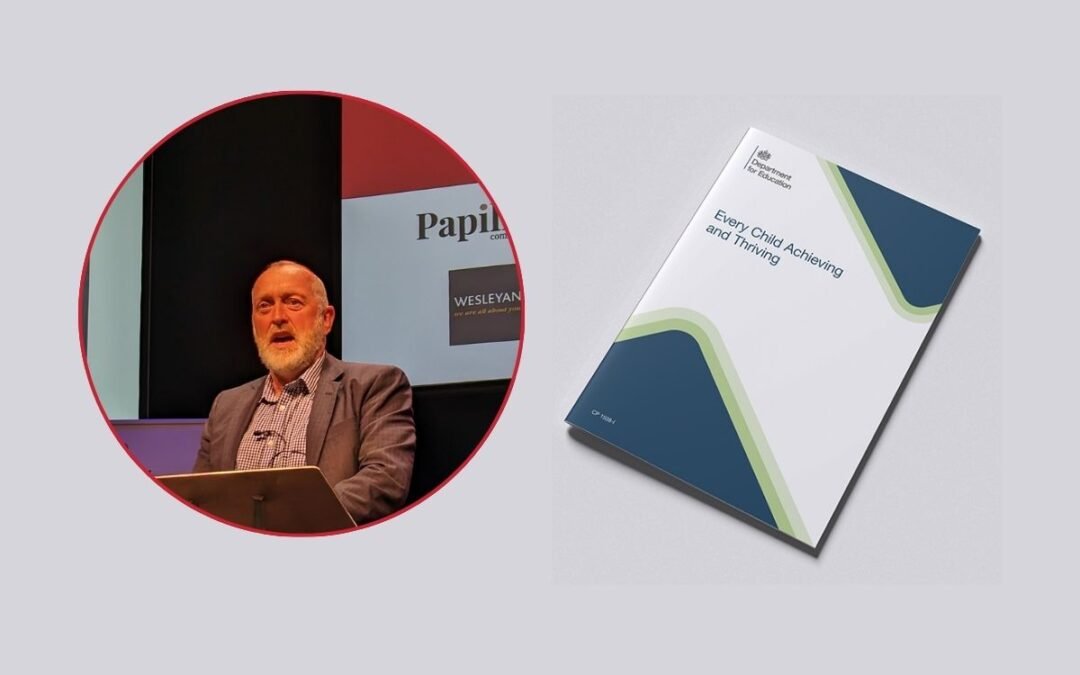This article was written by Jeremy Barnes and first appeared on the blog ‘Bald Headteacher’. Jeremy is Primary Schools Lead at Pope Francis CMAT.
There is a section in the Jonathan Heidt book ‘The Anxious Generation’ where he uses the Polynesian proverb of ‘standing on a whale, fishing for minnows’, a beautiful way of saying that people neglect their potential by focusing on trivial matters. Heidt uses the proverb to colour his persuasive case that childhood is being completely changed by smart phones, screen time and social media in ways we are yet to fully understand. But worryingly, we prefer to ignore this enormous change in childhood, instead focusing on more inconsequential issues.
The proverb could also be applied to much of what is happening in our public discourse at the moment. Diligently, we take aim at issues which are of little importance, the minnows, whilst conveniently avoiding the really big issues. The whale lies unnoticed under our feet. And it’s a really big whale. Climate change comes to mind, barely making the headlines now.
Matthew Syed, who I admire greatly, seemed to be scratching the same sore in his Sunday Times column last month. There was almost an air of complete frustration in his words. How much more do we need to be revealed before people wake up to just how bad things might get? He argues that our sense of collective entitlement is preventing us from doing anything about it.
I thought I’d try and expand on this theme from an educational standpoint. For in our educational world, we too are fishing for minnows, conveniently ignoring the immense issues we must address if we are to find systemic resilience in the years to come. Whether silent corridors, or instructional coaching, or trad/prog, or meta-cognition, we twitter away with views of differing certainty, but these topics really pale into insignificance when compared to the gargantuan whales hidden under the water.
I feel there are three whales in particular, and I know that they are controversial. Indeed, that might be the reason why we ignore them. Each one crops up every time I speak to a headteacher, yet for political reasons they are usually brushed under the carpet or dealt with in a coded way. To name them, the three are the changing face of childhood and parenting, a SEND crisis that is out of control, and a crippling lack of finances and resources.
1. The changing face of childhood and parenting
We cannot improve the education of our young people without being honest about what has happened to parenting over the last few years. Parenting has become a lot harder, the support network around parents has all but disappeared, and schools are bearing the brunt of dissatisfaction, stress and upset. There has been a rapid escalation in the numbers of complaints made by parents to schools, to local authorities, to Ofsted, to anyone who will listen. It crosses all income groups, all socio-economic classes. It is endemic in our education system.
In my opinion, we have to do all we can to return to a consensus that the parent is the primary educator of their children, and then support them to have the skills needed to carry out this role. Despite my children being now in their 20s, I still believe that my wife and I are the first people who must deal with any failing, indiscretion, lapse or misfortune that befalls our children. Yes, I can seek support from the state, or from my wider community, but ultimately this is my responsibility and that of my family.
And yet the opposite appears to have happened. Responsibility is more and more being rebounded back to the state, and schools are the main forum for absorbing this. Teachers regularly receive abuse, vitriol and aggression when things don’t go the way of the parent. Demands are way out of proportion with what can be reasonably expected. We are not talking of a majority by any means, but a sizeable and growing minority, enough to present a real challenge to most school communities. Whatsapp groups share these dissatisfactions to a wider audience, undermining trust in authority and spreading a sense of injustice.
I do not wish to castigate parents as if it is their fault. It is an increasingly difficult job. I do feel great empathy towards the challenges they face. They need support and guidance to deal with children’s lives that are very different to children before 2010. Sure Start centres, equipped with teeth and resources, overseen by school leaders, are the way forward, but this is one for the whole of society and cannot be left simply to schools to deal with.
2. A SEND crisis that is out of control
My wife was talking yesterday about the son of a friend of ours. He’s just finished a fabulous year abroad with his girlfriend, working and gaining experience of living in another country. His mother knows he is on the ASD spectrum but has not requested any support throughout his education, instead keeping a close eye on how he engages with situations and navigates the various challenges of growing up.
This was typical ten or twenty years ago, and whilst it is true that many children’s neuro-diversity might have been missed, or that their parents weren’t quite so skilled in recognising it, we have over-corrected to such a degree that we now approach a school system (largely affecting primary schools at the moment) where as many as 50% of pupils have some sort of diagnosis for a recognised special educational need. The financial impact of this is bankrupting the country and the social impact is even worse, with a generation of young people being told that there is something that is preventing them from navigating the world, instead of assisting them.
I feel very strongly about this because I grew up with a severely disabled brother and saw how my parents coped with his care. They were incredibly grateful for anything the state did to help, but never expected anything from it. I am convinced that this should be the default position, and that schools should work alongside parents to support them in their responsibilities. Parcelling up individual packets of money, accompanied by impenetrable EHCPs (educational and health care plans), has promoted a culture of ‘my child comes first, I’m not really bothered about the others, and if I don’t get what I want from you, I’ll go somewhere else to find it’.
I fear that the much-promised reforms due later this year will fail to address this fundamental poison at the heart of the crisis – that there is a form of consumerism that has run riot, leaving schools utterly overwhelmed and responding with equally vapid talk of adaptive teaching (another minnow in my opinion). Headteachers are understandably wary of exercising their professional judgement for fear of reprisals, and local authorities know that any challenges are likely to be won at tribunals. So we are all ignoring the whale and instead looking for minnows to distract us.
3. The crippling lack of resources
I must start with some good news. If the birthrate continues to decline, then in about ten years or so, the government will be able to increase the age-weighted pupil allowance … and, in buildings that will contain many surplus rooms, the pressure might be eased a little.
The problem is getting there. We have to accept the inevitable, that declining numbers means less staff and the threat of school closures. I believe this is already happening in London. I may be behind the curve if some local authorities and multi-academy trusts have set in place 5 or 10 year plans to address the issue, but it doesn’t seem to be being addressed strategically. At the same time, we anticipate that artificial intelligence will take on a lot of the work currently being done by accountants, business managers, lawyers, office staff and maybe even teachers.
But I suspect there lies a dissonance between what politicians, local leaders or education know needs to happen, and what teachers and parents expect. For example, are unions and pressure groups actively involved in bridging this communication gap? This is particularly important around emotive issues such as pupils with special educational needs. Because there simply isn’t any money left.
The key word here is dignity. School buildings hold emotive power, often bearing a legacy stretching back many decades. Schools need to be treated with dignity. Similarly, teachers facing redundancy need to know, at the very least, that their work has been valued, that there may be other opportunities for them to find a meaningful role to support our communities. Otherwise, more will head off to Dubai.
This cherishing of the individual needs to be accompanied by a communications strategy that is exceptional, that involves unions, politicians and local authorities, where a long-term plan is understood by all.
What I see at the moment is an absence of strategy, a failure to get ahead of the curve and accept the profound demographic and technological changes in our society at a time when buildings are crumbling and budgets are all falling into the red. We have to be honest about this and tell a story of incredible fortitude shown by school staff who, maintain high standards in their schools whilst all around them – finances, buildings, wider support – dissolves into decline. We need to give schools a break and show them some dignity.
Dealing with all three whales requires exceptional leadership that is joined-up and honest. It needs a strategy that straddles ten years at the very least. It has to be referenced in local Trust, diocesan and local authority strategies. The quasi-privatisation of the education system may have released energy and innovation during the last decade, but we are now heading into crisis territory now, if we aren’t there already. Far from being gleaming castles in MAT-land, these organisations now need to become more like field hospitals, supporting on the front line. There needs to be unity and solidarity amongst all participants and across the political spectrum.
The whales aren’t going away, and they also like to eat the minnows whilst they are waiting.
Additional Resources:
National #TrustLeaders Symposium 2025


